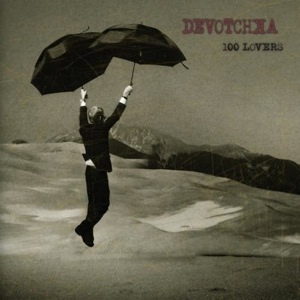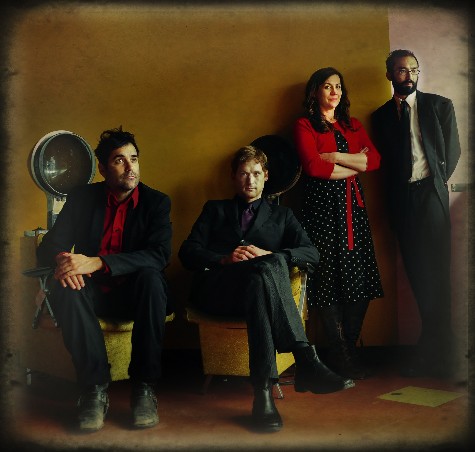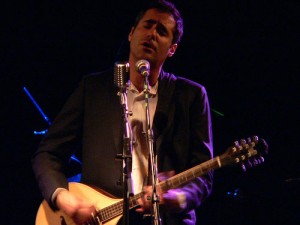Music Review: DeVotchKa — Indie Rock Gone Eclectic
Listeners expect global diversity from DeVotchKa, and in its latest album, the group delivers on its mission to make indie rock with plenty of exotic flair.
100 Lovers by DeVotchKa. ANTI-.
By Lucien Flores
The members of DeVotchKa call Denver, Colorado home, but the quartet is not your standard indie rock outfit by a long shot. Eclectic to the point of the omni-cultural, the band is one of those rare musical acts that, like Beirut and Gogol Bordello, makes use of the rhythms and riffs (Slavic, Romani) of Eastern-European music and dares to go further, experimenting with Mariachi, Indian, folk, punk, and more.
Lead singer Nick Urata croons passionately with a distinctively slurred, almost accented voice while also playing a hodgepodge of instruments from the standard guitar and piano to the more unusual (at least for indie rock) trumpet, theremin, and bouzouki. Other instruments the quartet uses are the sousaphone, violin, and accordion.
When DeVotchKa effortlessly meshes these global influences and uncommon orchestration, the results can be galvanic, from amazingly fun, Eastern European romps (“C’est Ce La”) to grandiose, indie-rock anthems (“How It Ends”). And its sound is finally being recognized by a broader audience. After struggling as a burlesque band for a few years, the band’s 2004 effort How It Ends made some real noise on the indie scene. However, it wasn’t until after being nominated in 2006 for a Grammy Award for “Best Compilation Soundtrack” for the film Little Miss Sunshine that the band garnered more recognition.
DeVotchKa comes to Boston’s Paradise Rock Club on March 26, which will be its only Massachusetts stop. If nothing else, when else are you going to see a sousaphone live? The group will also appear at Higher Ground in Burlington, VT, on March 28.
The group’s most recent album, 100 Lovers stays true to form, featuring a multitude of musical influences. Eastern European riffs predominate, though mariachi and Latin sounds dominate the last few songs.
The album’s opening song, “The Alley,” is a microcosm of the album itself. A trance-like ambiance is established and followed by a marching snare; the tune’s daze is finally blasted away by crashing cymbals and Urata’s eerie voice. The model for the track is the fireworks of Arcade Fire: the group comes closest to that sound with “All The Sand In All The Seas,” one of the strongest tunes on the album. The menacing (at times) track is driven by rollicking piano, ambient guitar, and marching drum.
“100 Other Lovers” is the album’s catchiest and strongest number. After generating a dreamlike spell, Urata’s vocals jolt us awake, while the sounds of strings and a delectable organ supply some charm. At the end, the song returns us to the opening trance and fades out, which brings the indie rock segment of the album to an end.
On “The Common Good,” DeVotchKa experiments with an Indian sound, commencing with hand-claps and frantic strings. However, the Indian influence is abandoned after shimmering strings and a rollicking snare are introduced. The experiment with an Indian sound is admirable, but the latter is used so halfheartedly that the attempted fusion with indie rock doesn’t come off.
Starting with “The Man From San Sebastian,” the album embraces a wealth of Latin influences. “San Sebastian” is a remarkably fun song with sinister Spanish influences; bright accordion and undulating guitar combine to create an atmosphere that’s ripe for danger, sword fights, and pencil thin mustaches. The bright horns of mariachi make their way into “Bad Luck Heels,” while “Contrabanda” has an almost-cumbia flair to it. On the unique “Ruthless,” Urata flirts with Spanish lingo and guitar, supported by timbales, quicksilver accordion playing, and theatrical strings.
The one exception to the second half Latin explosion is “Exhaustible,” a light, lazy afternoon love song with a whistle chorus and cheery background vocals. Ending with the group bursting into laughter, the whimsical song is a nice change of pace from the busier tracks.
Overall, 100 Lovers strikes me as DeVotchKa’s admirable and ambitious effort to create a grander sound. The band reaches for the brilliantly combustible heights of Arcade Fire’s magnum opus Funeral. At times it ends up working too hard and falls short. But listeners expect nervy diversity from DeVotchKa, and the group delivers on its efforts to make indie rock with plenty of exotic flair. DeVotchKa comes to Boston’s Paradise Rock Club on March 26, which will be its only Massachusetts stop. The group will also appear at Higher Ground in Burlington, VT, on March 28.



